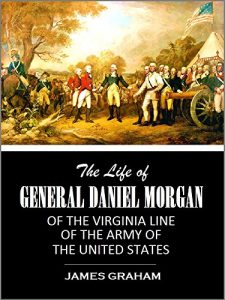Honorable James Graham (1815- 1878) was a resident of New Orleans, member of Congress, and historian.
Daniel Morgan (1736 – 1802) was an American pioneer, soldier, and United States Representative from Virginia. One of the most gifted battlefield tacticians of the American Revolutionary War (1775–1783), he later commanded troops during the suppression of the Whiskey Rebellion (1791–1794).
Graham writes:
"At the death of General Morgan, his papers, correspondence, &c, went into the possession of his son-in-law, General Presley Neville. During the fifteen or twenty years which succeeded, many of these papers were lost or destroyed. What remained of them at the termination of this period, however, were collected, arranged, and bound into two large volumes, by the general's grandson, Major Morgan Neville, to whom, at the death of his father, they were left. When he died, these volumes became the property of his widow, who submitted them to my perusal, with the object of ascertaining whether the publication of a select portion of their contents would be advisable or not. This collection is a very valuable one, embracing as it does, letters hitherto unpublished, from Washington, Greene, Lafayette, Wayne, Gates, Jefferson, Hamilton, Henry, Rutledge, and many other distinguished men of the revolutionary era."
Incidentally, this interesting biography is quite a history of the French and Indian and Revolutionary wars, at least in many of their principal movements and external fortunes. The work appears to have been undertaken with the design of exhibiting the favorable and engaging side of one of the bold and adventurous though less celebrated heroes of those heroic times; and it is faithfully done.
This book originally published in 1856 has been reformatted for the Kindle and may contain an occasional defect from the original publication or from the reformattitng.
Daniel Morgan (1736 – 1802) was an American pioneer, soldier, and United States Representative from Virginia. One of the most gifted battlefield tacticians of the American Revolutionary War (1775–1783), he later commanded troops during the suppression of the Whiskey Rebellion (1791–1794).
Graham writes:
"At the death of General Morgan, his papers, correspondence, &c, went into the possession of his son-in-law, General Presley Neville. During the fifteen or twenty years which succeeded, many of these papers were lost or destroyed. What remained of them at the termination of this period, however, were collected, arranged, and bound into two large volumes, by the general's grandson, Major Morgan Neville, to whom, at the death of his father, they were left. When he died, these volumes became the property of his widow, who submitted them to my perusal, with the object of ascertaining whether the publication of a select portion of their contents would be advisable or not. This collection is a very valuable one, embracing as it does, letters hitherto unpublished, from Washington, Greene, Lafayette, Wayne, Gates, Jefferson, Hamilton, Henry, Rutledge, and many other distinguished men of the revolutionary era."
Incidentally, this interesting biography is quite a history of the French and Indian and Revolutionary wars, at least in many of their principal movements and external fortunes. The work appears to have been undertaken with the design of exhibiting the favorable and engaging side of one of the bold and adventurous though less celebrated heroes of those heroic times; and it is faithfully done.
This book originally published in 1856 has been reformatted for the Kindle and may contain an occasional defect from the original publication or from the reformattitng.






